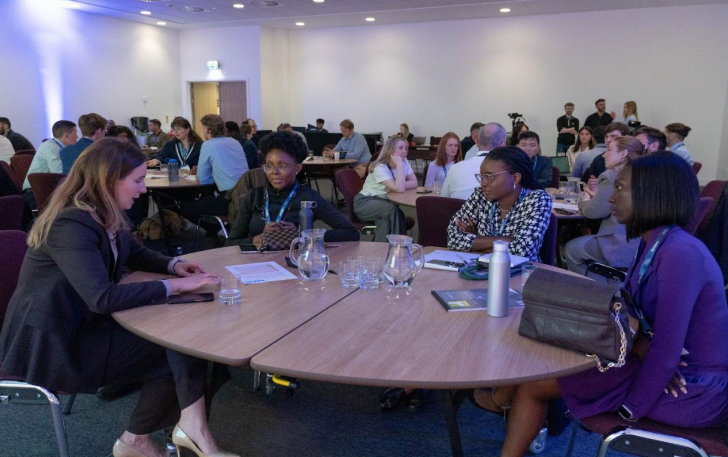"Decarbonise not De-industrialise" A Call to Action from Aberdeen’s Early-Career Energy Professionals
September 2025
Friday, 01 August 2025
"Decarbonise not De-industrialise"
A Call to Action from Aberdeen’s Early-Career Energy Professionals
The young- and early-career energy professionals in the room on Tuesday 20th May would attest to the buzz. A buzz of momentum that grew as the DEVEX workshop “Empowering Conversations: Bridging the Gap Between Energy and Community” unfolded. A panel of industry advocates stated the inconvenient reality: in 2025, oil and gas accounts for 75% of the UK’s total energy consumption (1). Sharing ways to communicate this message in an empathetic yet evidence-based way without alienating people was the task at hand. These are our thoughts. There was unequivocal agreement in the room that reducing the energy industry’s impact on the environment remains vital. However, policy to promote this needs to be rooted in evidence.
These are the facts:
● Since 2018, the UK oil and gas industry has cut methane emissions by over 50% (1).
● Between now and 2050, the UK will require 13-15 billion barrels of oil and gas to meet
domestic demand (1).
● Under current legislation, the UK will produce <4 billion barrels of oil and gas (1).
This stance could leave the UK vulnerable to overseas imports, with NSTA analysis from 2023 stating that the “carbon intensity of producing gas domestically is on average almost four times lower compared with importing gas in LNG form” (2). The UK imported almost two-thirds of its gas demand in 2024, with half of imports coming from Norway (3). With the energy sector still under the shadow of the Energy Profits Levy (windfall tax) amongst other headwinds, the imbalance in supply and demand could result in a ~£25 billion a year black hole in the UK’s finances. In addition, ~200,000 jobs in the sector could be under threat and the supply chain could contract (4). Energy policy has long been punitive, but an estimated 600 jobs lost in just 10 days in Aberdeen in May is surely a step too far (5). There have been more livelihoods lost since in communities up and down the UK (6).
Some of the most vocal supporters of a just energy transition were in that room in May – the brightest young minds in the energy industry. They understand what it takes to keep the lights on, and homes heated for all. Speaker John Underhill (Director of University of Aberdeen’s Centre for Energy Transition) candidly shared his experience of doing homework under candlelight amid blackouts in 1970s Britain. Blackouts caused by power shortages due to the oil crisis and the coal miner’s strike. At that time, the UK relied on oil imports from the Middle East. The development of North Sea oil reserves supported a largely overlooked bail-out of the UK economy. Life would look very different had we not stepped up domestically.
So, what is different in the UK today? We face an energy trilemma – security & resilience of supply; affordability & equitability; environmental sustainability & climate compatibility. Yet largely, we take the energy we use for granted. We can access it at the flick of a switch. Have we, the general public, become energy illiterate due to abundance of supply since the North Sea oil boom? We didn’t do our homework in blackouts – did you? The UK came “within a whisker” (7) of blackouts on 8th January 2025. Low wind, sub-zero temperatures and grid strain compounded into a perfect storm of elevated electricity demand. This prompted the UK’s grid operator NESO to call for “an extra 1,700 megawatts of power, equivalent of the output of three gas-fired power plants, to generate enough electricity to power homes across England, Scotland and Wales within its normal safety margins” (7). This incident also exposed the UK as having amongst the lowest levels of gas storage in Europe.
In recent decades, the UK has developed innovative new ways to generate energy – in the North Sea we have pioneered technology and engineering solutions that have been exported across the world. New industries have sprung up creating well-paid jobs that support communities. We are in the best position to tackle the trilemma. However, we must acknowledge the inconvenient reality about where our energy comes from – and sculpt our energy policy to account for it. Energy is fundamental to our quality of life in the UK and at present, renewables alone cannot plug the gap. We still need oil and gas; and we risk losing technical expertise, critical infrastructure and energy independence in one fell swoop if we continue down this path. As our Norwegian neighbours are demonstrating, a just transition allowing multitude energy sources to thrive in tandem is possible. These are the same neighbours that met over 30% of the UK’s demand for gas in 2024 and whose largest producer, Equinor, has agreed to supply Britain with enough gas annually until 2035 to supply approximately five million homes (3).
And so, we revert to the initial task we faced on that spring day in Aberdeen: communicating the importance of our industry in an empathetic yet evidence-based way, allowing us to have impactful conversations with friends, family and the wider community. The consensus in the room was that public opinion on this subject is often driven by media sensationalism, compounded by misinformation. The energy debate in the UK has become disproportionately polarised and feels like it has lost all nuance, with individuals obliged to choose one of two extreme stances on opposite sides. The reality, as we hope we have demonstrated, is a lot more intricate than that.
Given the points above, while also considering the UK's territorial contribution to global emissions is <1% (8), we leave you with a simple question. In an uncertain world, are you willing to strip the UK of its ability to generate energy; lose out on significant economic contribution; and sacrifice thousands of jobs in the process?
Help us cut through the noise – if you learned something or if something surprised you reading this, please share widely. We would like to invite a conversation. With other young professionals. With friends, families and neighbours. With students considering their futures. This event was just the start of what we hope will be many honest & pragmatic conversations about energy, climate and community in Aberdeen and beyond.
Thank you.
On behalf of the DEVEX 2025 EC-YP Committee
Watch the joint statement video here.

Lucinda Layfield engaged in discussion at the event.

Workshop speakers pictured (from left): John Underhill, Henk Kombrink, Chris Banks, Lucinda Layfield. The following question was posed to participants at the start and end of the event: do you feel prepared for conversations challenging your choice to work in the energy industry? 38% of the participants responded positively at the start, compared with 73% at the end.
References:
1: OEUK Business Outlook Report, 2025
2: Natural gas carbon footprint analysis, NSTA, 2023
5: Aberdeen & Grampian Chamber of Commerce, 2025












